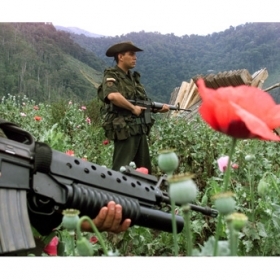The 40th anniversary of Washington’s war on drugs has sparked calls for the decriminalization of narcotics, but what may seem like common sense for the U.S. could spell disaster for Latin America.
Pleas for reform have come from a wide variety of voices. David Simon, creator of the TV series “The Wire,” recently published an open letter to Attorney General Eric Holder offering a new season of the popular show in exchange for a reconsideration of the war on drugs. In The New York Times, Charles Blow called the war “an unmitigated disaster, an abomination of justice and a self-perpetuating, trillion-dollar economy of wasted human capital, ruined lives and decimated communities.”
And, most notably, the Global Commission on Drug Policy, which consists of 19 political and cultural titans from the U.S. and other countries around the world, released a report on June 2 calling for the establishment of regulated marijuana markets and the decriminalization of recreational drugs.
In developed nations like the U.S., where criminal groups don’t present a real threat to democratic institutions, the potential impact of decriminalization is relatively easy to consider: Would the benefits (lower incarceration rates, lower spending on anti-drug agencies, etc.) outweigh the costs (higher rates of drug use)? A growing number of observers say that they would.
But in Latin America — where public security is more precarious, criminal groups are far wealthier, drug use is lower, and government institutions are weaker — the calculus is different.
The key distinction is between the short- and long-term effects of an end to prohibition. Legalization of marijuana, cocaine, and the rest would, over time, cut the profits of Mexican criminal groups. This would, eventually, lead to smaller, weaker, gangs. The criminal heirs to Joaquin Guzman, alias “El Chapo,” could not enjoy anything close to his notoriety and power if drugs were legalized.
However, this would be an evolutionary process, rather than an overnight switch. In the meantime, there would likely be panic in the Mexican underworld, as the 500,000 people who presently make their living from the drug trade would have to find another way to pay the bills. While a small number might take it as a cue to pursue a legitimate way of life, most, presumably, would not.
Compared to most U.S. gangsters, Mexico’s drug traffickers (as well as Colombia’s, Guatemala’s, etc.) are far better armed and more liberal with violence. They also have a great deal of experience with extortion, kidnapping, human trafficking, pirate merchandise, even oil theft, and an end to the drug prohibition would initially encourage them to double down on these alternative enterprises. Since extortion and kidnapping impose a much steeper penalty on society than surreptitiously moving a shipment of cocaine, legalization would likely not amount to an positive development in terms of public security in the short term.
In fact, something like this has already happened. One widely posited explanation for the surge of violence in Mexico is that it stems from the fracturing of the hegemonic organizations of decades past, which has led to the emergence of looser networks like the Familia Michoacana and the Resistencia. Because they don’t oversee the entire cocaine supply chain, from the Colombian jungles to the American streets, these groups have more vulnerable and volatile revenue streams. As a result, many Mexican gangs have reoriented their operations toward crimes like extortion and kidnapping, both of which have spiked as a result.
This is not an argument against legalization, merely a call to consider its implications fully. To reiterate: eventually, the lower profits would lessen the allure of organized crime, and push future would-be criminals into other walks of life. Likewise, the criminal groups that do exist would be less capable of bribing and bullying public officials, which would lead to stronger government institutions. But Latin America’s transition period would be tricky at best, and a humanitarian disaster at worst.
The best way to prepare for this potentially brutal transition is to increase the capacity of security agencies to punish extortion, kidnapping, and other crimes. With rates of impunity for all crimes at 98 percent, and for kidnapping at 84 percent, the justice system does little to discourage these crimes. In fact, perhaps the greatest disincentive against kidnapping and extortion today is the greater profit margins offered by drug trafficking, and the opportunity cost implicit in shifting resources away from smuggling the pricey narcotics contraband.
The end of drug prohibition would remove that opportunity cost, but more effective security agencies capable of closing most of the cases that come before them would provide an even stronger, more enduring disincentive. Therefore, legalization advocates need to pair their calls to rethink drug policy with redoubled efforts to strengthen Latin America’s police agencies, judiciaries, and penal systems.
This is a daunting undertaking that will take years to carry out, but, fortunately, legalization is also years away from being a viable political option. And such institutional improvement is also the best way to limit the ill effects of the drug trade for as long as prohibition is in effect.

